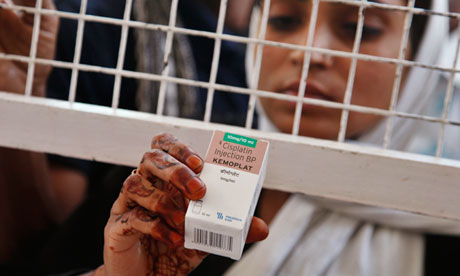
Healthcare activists
say the ruling against Novartis ensures poor people will be able to
access to cheap versions of cancer medicines. Photograph: Rajesh Kumar
Singh/AP
The Indian supreme court has refused to allow one of the world's leading pharmaceutical companies to patent a new version of a
cancer
drug, a
decision campaigners hailed as a major step forward in enabling
poor people to access medicines in the developing world.
Novartis
lost
a six-year legal battle after the court ruled that small changes
and improvements to the drug Glivec did not amount to innovation
deserving of a patent. The ruling opens the way for generic companies in
India
to manufacture and sell cheap copies of the drug in the developing
world and has implications for HIV and other modern drugs too.
Campaigners
were jubilant.
A ruling in Novartis's favour would have reduced poor
people's access to the drug, said Jennifer Cohn, of Médecins Sans
Frontières (MSF). "The fact that India says patents are to reward
innovation as opposed to small changes does stay true to the concept of
what a patent should be."
But Novartis said the decision
"
discourages future innovation in India". Ranjit Shahani, the firm's
vice-chairman and managing director in India, said the ruling was "a
setback for patients that will hinder medical progress for diseases
without effective treatment options".
He said the Swiss company
will be cautious about investing in India, especially over introducing
new drugs, and seek patent protection before launching any new products.
It will continue to refrain from research and development activities in
the country. "
The intellectual property ecosystem in India is not very
encouraging," Shahani told reporters in Mumbai after the ruling.
Glivec
is an important drug in the treatment of myeloid leukaemia and has
transformed prospects for patients in rich countries. It is a targeted,
biological therapy that blocks cancer growth in patients with a
particular gene mutation. But like all targeted therapies, it is very
expensive, costing more than £1,700 a month.
Historically India
only had limited patent protection on drugs and generic companies in the
country made versions of many medicines. It was only when Indian firms
began to make cheap copies of HIV drugs that it became possible more
than a decade ago to contemplate the treatment of millions of people in
impoverished countries of Africa, where the Aids epidemic was at its
worst.
But in 2005,
India became compliant with World Trade
Organisation rules on intellectual property and now
grants patents on
innovative new drugs. Patents usually run for 20 years or more from the
date they are taken out.
Glivec was already on the market,
however, so Novartis decided to seek a patent on a slightly altered
version, potentially giving it a longer period of market exclusivity.
The supreme court has thrown out the application, saying the new drug is
not significantly different from the old version, and ordered Novartis
to pay costs.
At stake in the legal battle was not just the right
of generic companies to make cheap drugs for India once original patents
expire but also access to newer drugs for poorer countries in much of
Africa and Asia. India has long been known as the pharmacy of the
developing world.
Dr Unni Karunakara, the president of MSF, said:
"The supreme court's decision now makes patents on the medicines that we
desperately need less likely. This marks the strongest possible signal
to Novartis and other multinational pharmaceutical companies that they
should stop seeking to attack the Indian patent law."
In a
statement, the Cancer Patients Aid Association in India (CPAA), which
had opposed the patent application, said: "We are very happy that the
court has recognised
the right of patients to access affordable
medicines over profits for big pharmaceutical companies through patents.
Our access to affordable treatment will not be possible if the
medicines are patented. It is a huge victory for human rights."
The
case
hinged on the interpretation of section 3(d) of the Indian Patents
Act, which does not allow patents of new versions of known drug
molecules, unless they make the medicine significantly more effective
than before.
Novartis argued that better physicochemical
qualities, such as shape of the molecule, stability, hygroscopicity and
solubility, would satisfy the test of enhanced efficacy.
But the
court decided that the changes were simply an attempt at "evergreening" –
refreshing the drug so that a new patent would be granted – which is
common practice in Europe and North America.
Anand Grover, senior
counsel and director of Lawyers Collective HIV/Aids Unit, who
represented the CPAA in the courts, said: "The supreme court's
interpretation of section 3(d) keeps it intact. It is alive and kicking.
It gives life to parliament's intent of facilitating access to
medicines and of incentivising only genuine research.
"By refusing
patent monopolies on minor changes to known molecules, th
is judgment
will facilitate early entry of generic medicines into the market for
other medicines and diseases too. The impact will be felt not only in
India, but also across the developing world."
The ruling is
thought likely to affect drugs belonging to several other companies.
Pfizer's cancer drug Sutent and Roche's hepatitis C treatment Pegasys
lost their patented status in India last year. They may now find it
harder to obtain a patent on new versions.
In an interview with
before the ruling, Novartis threatened to stop supplying India with new
medicines if it did not get the patent protection it believes its
investment and innovation deserve. "If the situation stays as now, all
improvements on an original compound are not protectable and such drugs
would probably not be rolled out in India," Paul Herrling, who headed
the company's legal battle in India, told the Financial Times. "Why
would we?"
